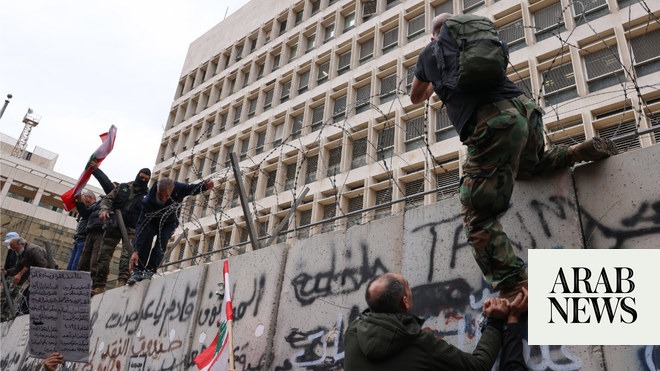
BEIRUT: The US has told Lebanon it should not fear a sanctions law over its plans to receive energy supplies from the region, according to a statement from Prime Minister Najib Mikati’s office on Friday.
US ambassador to Lebanon, Dorothy Shea, handed Mikati a letter from the US Treasury to answer Lebanese authorities’ concerns about regional energy agreements that the US had helped to facilitate with Jordan and Egypt.
The diplomat said: “There will be no fears from the US sanctions law. This message represents forward momentum and an important milestone as we continue to make progress to achieve cleaner and more sustainable energy, to help address the energy crisis.”
Lebanon is grappling with a deep financial crisis and a weak local currency that is piling pressure on the population.
On Friday, the dollar exchange rate on the black market dropped by more than LBP5,000 at once to reach LBP27,500.
Money exchange shops tried to limit their sales of dollars after people rushed to buy or sell them.
The Central Bank issued a circular on Dec. 27 and followed it up with amendments. The circular removed a ceiling related to bank purchases of dollars using the official Sayrafa exchange rate platform.
It allowed depositors and account holders of Lebanese pounds to withdraw their deposits and salaries in dollars based on the rate set by Sayrafa.
The move pumped dollars into the Lebanese market by replacing withdrawals from pounds with fresh dollars.
A new clause was introduced allowing the banks to increase the quota in dollars, by buying dollar bills from the Central Bank at the rate set by Sayrafa using the pounds owned by these banks or their clients with no specific ceiling. This was aimed at meeting the demand for dollar withdrawals.
Financial experts said these measures would reduce the dollar exchange rate on the parallel market as a result of supply and demand and take back the pounds “stashed by citizens in their homes,” bringing down the inflation.
It also allowed the reassessment of the Central Bank"s role in the issue of controlling the dollar exchange rate, the experts added.
This role had recently faded as a result of speculation and the Central Bank’s focus on subsidizing commodities, fuel and medicines, they pointed out.
The main focus should have been on controlling the dollar rate as it was the starting point to control other prices, said the experts.
The crisis of confidence in the banking sector has been escalating since late 2017, leading to a decrease in the flow of capital to Lebanon, while a parallel market became prominent in Sept. 2019. The political authorities at the time did not - and still have not - agreed to approve the introduction of capital controls.
Black market money changers have been flooded with Lebanese pounds. Audio recordings of them expressing their confusion and concern about the latest developments have been shared on social media.
A banking expert told Arab News: “The Central Bank began a test procedure on Dec. 27. People exchanged their salaries at banks from Lebanese pounds to dollars based on the Sayrafa exchange rate.
“Money exchange shops are now left with huge amounts of dollars, for people are no longer willing to buy dollars from them because of the high exchange rate, which led to a decrease in the exchange rate of the dollar on the black market.
“The Central Bank is thus trying to maintain the dollar exchange rate within a certain range. It is possible to say that, with this measure, the Central Bank is restoring its role in the currency market.”
However, the banking expert feared a surge in the dollar exchange rate during the weekend, with banks closing their doors and the attempt of Syrian dealers in the Bekaa to buy dollars from the region’s money changers.
He also expected the exchange rate to drop again at the beginning of the week with the banks resuming their work.
Economist Dr. Louis Hobeika told Arab News: “These are superficial declines, as the political situation is further deteriorating and nothing suggests the emergence of solutions any time soon.
“If this measure is not accompanied by the resumption of the Cabinet’s meetings and the launch of a recovery plan that includes implementing reforms and restoring confidence in the banking sector, these measures will be nothing but unreliable tactics. The issue is not monetary, but political and economic. What the Central Bank is trying to do is fine tuning.”
When asked if the measure may lead to the unification of the dollar exchange rate, which is one of the International Monetary Fund’s demands, Hobeika replied: “I think that the rate of the Sayrafa platform is the most reasonable one in Lebanon.”
But Hobeika said the matter had “nothing to do” with the IMF.
The IMF delegation, which was scheduled to arrive in Lebanon this month, has postponed its visit until February.












